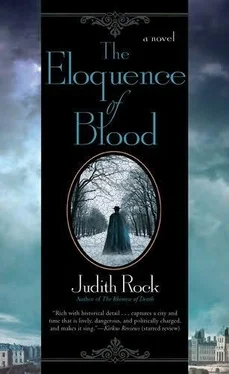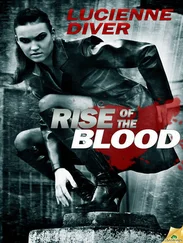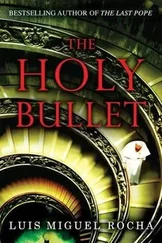Judith Rock - The Eloquence of Blood
Здесь есть возможность читать онлайн «Judith Rock - The Eloquence of Blood» весь текст электронной книги совершенно бесплатно (целиком полную версию без сокращений). В некоторых случаях можно слушать аудио, скачать через торрент в формате fb2 и присутствует краткое содержание. Жанр: Исторический детектив, на английском языке. Описание произведения, (предисловие) а так же отзывы посетителей доступны на портале библиотеки ЛибКат.
- Название:The Eloquence of Blood
- Автор:
- Жанр:
- Год:неизвестен
- ISBN:нет данных
- Рейтинг книги:5 / 5. Голосов: 1
-
Избранное:Добавить в избранное
- Отзывы:
-
Ваша оценка:
- 100
- 1
- 2
- 3
- 4
- 5
The Eloquence of Blood: краткое содержание, описание и аннотация
Предлагаем к чтению аннотацию, описание, краткое содержание или предисловие (зависит от того, что написал сам автор книги «The Eloquence of Blood»). Если вы не нашли необходимую информацию о книге — напишите в комментариях, мы постараемся отыскать её.
The Eloquence of Blood — читать онлайн бесплатно полную книгу (весь текст) целиком
Ниже представлен текст книги, разбитый по страницам. Система сохранения места последней прочитанной страницы, позволяет с удобством читать онлайн бесплатно книгу «The Eloquence of Blood», без необходимости каждый раз заново искать на чём Вы остановились. Поставьте закладку, и сможете в любой момент перейти на страницу, на которой закончили чтение.
Интервал:
Закладка:
“Like the swallow skimming the clouds, like the eagle racing the wind, like-”
“Just show us, please, Monsieur Bertamelli.”
The boy leaped to the center of the dancing space and, without waiting for Charles’s stick, launched himself into a blur of aerial steps. His scholar’s gown billowed and rippled through pas de rigaudon, pas de sissonne, pas assemble, and some steps Charles suspected Bertamelli’s feet of inventing on their own.
Laughing for sheer pleasure at the boy’s exuberance-and raw talent-Charles called, “Thank you, Monsieur Bertamelli, well done.” Bertamelli kept dancing. Charles clapped his hands. “Mon brave, come back to earth!”
Bertamelli stopped, panting and sweating, and waited anxiously.
“The part is yours; you will be our Celse, Monsieur Bertamelli.”
Bertamelli flung out his arms, and for a moment Charles thought the boy was going to rush at him. “I thank you, maitre! My mother will be so proud. All Milan will be so proud!”
He bowed and marched back to his confreres, a triumphal procession of one.
Cutting off Montmorency’s scornful laughter with a look, Charles swallowed his own grin and consulted his list. St. Ambrose was to express his joy at finding the holy bodies by dancing a forlane, a fast dance only a little calmer than a gigue. Which Charles thought a little extreme for an elderly saint, but no doubt the miraculous discovery had renewed his youth.
“Monsieur Lennox.”
The English boy flinched a little, his blue eyes anxiously fixed on Charles. He was of middle height, not as dark as his royal father and seemingly with none of Charles II’s legendary selfassurance.
“I would like you to be our Saint Ambrose, Monsieur Lennox. If I remember correctly, you do not yet know the forlane steps, but your dancing is clean and clear, and you can learn it. I think you will do it well.”
“Oh. Thank you, maitre. No, I don’t know that dance. I will try, but-I mean, I hope I can. If-” He broke off, red-faced and sweating in the cold room, though he’d only been standing still.
“You will do it admirably, I am sure, monsieur.”
Which left Andre Chenac and Olivier Thiers. And Henri Montmorency.
“The rest of you,” Charles said briskly, “will play a variety of roles as Roman soldiers, sailors, and so on. Everyone will dance in the final chaconne.” He swept the group with a sober glance. “Now, hear me. Remember that this is our pre-Lenten show and its intent is to direct the thoughts of the audience toward keeping a holy Lent. The action of this lyrical tragedy is much the same as the action of the Latin tragedy. But lyrical tragedy is not simply action, it is also spiritual tragedy. You must make your characters’ emotions-not only their good and devout feelings, but their other feelings, too-clear to your audience through your bodies. Do you understand?”
They all-including Montmorency-nodded somberly, and even with a certain eagerness, Charles was moved to see. He never stopped being surprised at the depth to be found in the souls of teenage boys. When he wasn’t wanting to throttle them, he was often brought near tears by their innocent fervor. As he started to tell the boys what to do next, a lay brother opened the door.
“Maitre du Luc? The rector asks you to pardon this interruption, but he needs you in the grand salon.”
“Thank you, mon frere, I am coming.” Wondering what had happened now, Charles told the dancers to wait and hurried to the stage, where Jouvancy was deep in excited planning with his actors. When a break came in the talk, Charles told Jouvancy that the rector had summoned him.
Jouvancy made an exasperated sound. “Very well, you must go, of course. Send your dancers up here. Each group should know something about what the other is doing.”
With a stern command to avoid upsetting the rhetoric master, Charles sent his dancers to Jouvancy and hurried apprehensively downstairs.
When he reached the main building’s grand salon, where outsiders were received, he found Pere Le Picart waiting with M. Edme Callot and M. Germain Morel. Callot was the color of old paper and looked ten years older than he had two days earlier. Morel looked not much better. Charles turned questioningly to the rector, but Morel, who seemed to have assumed the responsibilities of a son of the house, spoke first.
“They arrested Gilles an hour ago. He is in the Chatelet.”
Charles’s heart sank. “For Martine Mynette’s murder?”
“And for his father’s.”
“Gilles is an idiot,” Callot burst out, wringing his hands, “but he is not a killer. And, mon Dieu, he is not a parricide!” His voice shook. “My poor Isabel has cried herself sick.”
Callot turned his head away and wiped furiously at his eyes. The rector guided him to an armchair by the wall and bade him sit.
“The worst thing,” Morel said, “is that now they have arrested Gilles, the police think they have done their work.”
Charles didn’t know what new evidence La Reynie had found, but Isabel Brion would certainly blame Charles himself for Gilles’s arrest, thinking he’d told La Reynie about her brother’s visit to Martine on Friday morning. He sighed. “Why are the police so sure he killed them, Monsieur Morel?”
“As for his father’s murder, we don’t know. But some bedeviled woman has sworn to our commissaire that she was looking out her window before dawn on Friday morning and saw Gilles leaving the Mynette garden gate.”
“She’s probably half blind,” Callot muttered. “Anyway, how could she tell who it was, before dawn in a side street, with the lanterns long out?”
“She claims there was light from the side door of the Mynette house, which, she says, was open,” Morel answered unhappily. “She may be lying, but-”
“She isn’t lying,” Charles said reluctantly. “Monsieur Gilles Brion was there. Mademoiselle Brion told me herself this morning, when I saw her home after the funeral. Her brother confessed to her that he had gone to talk to Mademoiselle Mynette before it was light. She came down and spoke with him in the garden. He said that he left by the garden gate. And, of course, that he left Mademoiselle Mynette alive.”
“The idiot!” M. Callot slapped his thin, veined hands on the arms of his chair. “Dear sweet Jesu, the turnip-balled idiot! I hope the Chatelet scares some sense into him. If being there doesn’t kill him before he’s even hanged. Or worse.”
The Chatelet might well kill him, Charles thought. Jail fever raged in prisons and few, guilty or innocent, escaped it if they stayed long enough. “Is he in a common cell, Monsieur Callot?”
“Of course not,” Callot growled. “Would I let him be thrown in with all the rabble of Paris?”
In the silence that fell, Charles saw that Morel was glancing furtively at the rector. The rector paid him no attention, standing serenely, hands folded at his waist, eyes cast down like a modest nun.
With the air of a man betting everything on a throw of the dice, Morel said, “Maitre du Luc, you have followed the police inquiry since Mademoiselle Martine Mynette’s death. You know Lieutenant-General La Reynie. We want you to help us. If your rector permits. We want you to look for the real killer of both Martine Mynette and Henri Brion. The police think they have no more need to look, and if the matter is left there, Gilles will certainly die.”
On the whole, Charles agreed. He looked at Le Picart. Le Picart raised his head, and his gaze hit Charles like gray lightning. Then he turned to study his guests. Neither they nor Charles moved a muscle.
“More than a man’s life is at stake here,” Le Picart said slowly. “Maitre du Luc, I think you should go and see Monsieur Gilles Brion. Whether he is guilty or innocent, visiting the prisoner is certainly within our purview. And speak to Monsieur La Reynie, if you can. But first, come to my office.” He turned to Callot and Morel. “Messieurs, I ask you to go to Mademoiselle Brion, who surely needs you, and wait patiently. I must think on what you have asked. We will send you a message saying what is decided. God go with you.” He sketched a blessing in the air and withdrew.
Читать дальшеИнтервал:
Закладка:
Похожие книги на «The Eloquence of Blood»
Представляем Вашему вниманию похожие книги на «The Eloquence of Blood» списком для выбора. Мы отобрали схожую по названию и смыслу литературу в надежде предоставить читателям больше вариантов отыскать новые, интересные, ещё непрочитанные произведения.
Обсуждение, отзывы о книге «The Eloquence of Blood» и просто собственные мнения читателей. Оставьте ваши комментарии, напишите, что Вы думаете о произведении, его смысле или главных героях. Укажите что конкретно понравилось, а что нет, и почему Вы так считаете.












